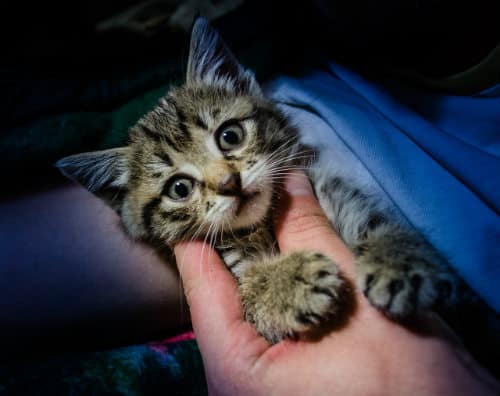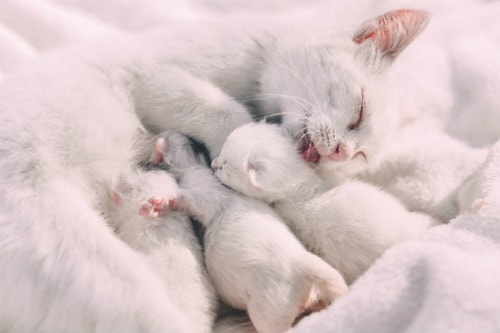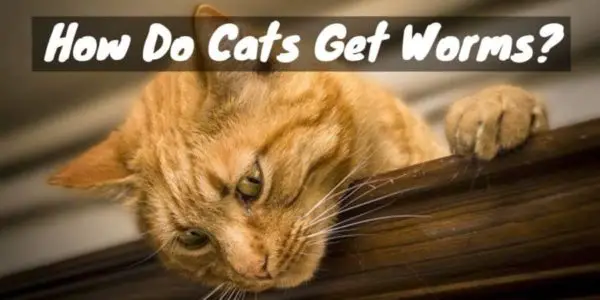Although they are not quite as prone to worms as a dog, most cats will probably get worms at some point in their life. This is a very common problem that all cat owners should be prepared to handle. Don’t make the mistake of thinking that this is a dog problem.
Where Do These Things Come From?
Intestinal parasites like worms are common for many kinds of animals. As such, your cat can easily become infested through contact with other animals or their feces. The list of ways in which this can happen is literally endless.
For instance, your cat might go out and kill a rat. The rat might be infested with worms or other parasites, and your cat might pick them up (or ingest their eggs) when they eat the rat. Even if they only eat a small part, it might still be enough.
[amazon bestseller=”cat worms treatment”]
They also might step in the fecal matter of another animal, meaning that they will later ingest the eggs while grooming themselves. This is one of the downsides of grooming yourself with only saliva and paws. A cat could also become exposed through mating with another cat.
What Types of Worms Are We Talking About Here?

If you want to become a little more familiar with these blood-sucking little critters, you might start with this article on gastrointestinal parasites of cats.
First of all, let’s talk about roundworms. These are by far the most common parasite in both dogs and cats. They have smooth, rounded bodies and are about 3-5 inches long. They are usually cream-colored. While a small number of them in an animal’s body will not cause a big problem, they will breed and cause problems before long. Some of these problems can be serious or even life-threatening.
Anyway, roundworms are almost never seen in kittens less than two months of age. This is the case because of the fact that the mother’s body filters out the worms and their eggs before they can reach the kittens. Since very young kittens do not eat and drink only their mother’s milk, this means that there is almost no opportunity for them to be exposed to roundworms.
It should be noted that these kinds of worms can parasitize humans. Although they are less likely to prey on a human, it can and often does happen. The biggest risk from this kind of worm is anemia resulting from blood loss.
Next, we will discuss hookworms. These are extremely small and slender worms, each one being less than an inch long. These worms attach themselves to the inner lining of the intestinal tract, feeding on the blood of their host. These worms cause small amounts of blood loss, and this can become very bad as they multiply.
If your cat’s feces are black and tarry, this is due to the presence of digested blood. If you see it once, it could just be something they ate. If you see it more than once, it means your cat probably has some hookworms. Thankfully, these worms are not particularly hard to remove. Most anti-worm medicines will take care of this species.
Finally, we will discuss the tapeworms. These worms are named for their long, flattened bodies. They look like a ribbon and can reach ridiculous lengths. The incredible lengths that can be attained by these worms can be a big problem. As the worm grows, it can outgrow the cavities in which it lives, causing all manner of terrible problems up to and including death. Thankfully, these are the easiest worms to detect.
[amazon bestseller=”cat hookworm”]
These worms normally live in the intestine and gastrointestinal tract, where they drink blood and absorb nutrients directly from the host. Their bodies are segmented, and they tend to break off small segments during their life cycle. Thankfully, even the cheapest of anti-worm medicines will do a good job of removing these creatures.
It should be remembered that your cat might not have a common type of infestation. While the vast majority of worm cases can be attributed to one of the three types listed above, there are some strange and uncommon bugs out there, so it’s always better to get a fecal test just in case.
What Are the Symptoms of Worm Infestation?

The symptoms of a worm infestation depend greatly on the type of worms that are present. However, there are several general symptoms that you should know:
- Inability to put on weight
- Excessive diarrhea
- Vomiting
- Excessive coughing
- Breathing troubles
- Dragging their rear end on the ground
- Swollen, distended stomach
- Irritation around the anus with a lot of licking from the dog
- Loss of Appetite
- Constipation
- Fecal irregularities
Any of these symptoms are a good indicator that your cat has worms, although it should be noted that all of these symptoms can indicate other problems. Don’t jump to conclusions if you see just one of these symptoms, especially if you only observe them once or twice. If your cat is exhibiting severe symptoms of any kind, you need to stop reading this article right now and take that animal to the vet.
If your cat has roundworms, the best way to detect them is through fecal analysis. For this, all you have to do is bring a sample of your cat’s stool to a vet and have it tested. If there are any roundworms or roundworm eggs present, they will be detected. From there, your vet will probably prescribe or recommend some medicine that will remove the intruders.
If your cat has hookworms, you will be able to tell because, apart from the symptoms above, their stools will be black and tarry. They may be partly red. In any case, bloody fecal matter is a dead giveaway that your cat might have some hookworms.
Hookworms enter the body through the bottoms of the feet. When they enter, they leave behind visible lesions that you can check. This is another good way to judge if your dog has hookworms.
If your cat has tapeworms, you can easily tell by taking a quick look at their feces. No, you don’t have to look very close, which is always a good thing. If your cat has tapeworms, you will see small segments that look like grains of rice in their stool. It is very easy to see them. Unless your cat just happens to have eaten rice recently, this is a sure sign that your cat has tapeworms.
[amazon bestseller=”cat immune support”]
Are There Other Factors That Can Irritate This Problem?

Fleas can be a serious aggravating factor when you are trying to keep your cat free of worms. This is a huge problem for both dogs and cats. The life cycle of an intestinal worm is a strange thing, and they can develop in more than one way. Fleas unwittingly help the worms along by acting as hosts for their young.
When the fleas lay eggs, the resulting larvae will feed on any organic material that they can find and digest. This includes worm eggs. Thankfully, fleas do not feed on the eggs of all worms, because many worms lay their eggs internally, where the fleas cannot get them.
Tapeworms are the major concern when considering the link between fleas and worms. Tapeworm eggs are often laid around the anus, and flea larvae will then consume them. What follows is like something out of a science fiction movie.
The worm larvae live within the flea, growing larger until it begins to eat its way out of the host organism. After freeing itself, the worm is then able to infect the nearby human through the nearest orifice.
The problem is further aggravated when you consider the fact that dogs often eat their fleas. As they chew and dig at their hide, they often eat a flea or two. If this flea is carrying worm eggs, it contributes to the overall infestation.
How Do I Treat This Problem?

Once you have identified a worm issue, dealing with it is relatively simple. You will need to figure out what kind of worms your cat is infested with and to administer some medicine that will kill the worms. After this, your cat will defecate the worms and the result will quite possibly be the most disgusting thing you have ever seen.
Identifying the type of worm involved is crucial so that you know what kind of medicine to apply. If you can afford it, just take your cat to the vet and let them decide which kind of medicine to use. If you can’t afford to do this, you will need to do plenty of research and make sure that you use the right medicine for the right infestation.
If you are unsure of the exact worm species and you need a wide-spectrum dewormer, I recommend fenbendazole. This is a very useful deworming medicine that is available under several brand names. Fenbendazole will remove most types of worms including roundworms, hookworms, and heartworms. It will even deal with some bacterial infections like giardia.
[amazon bestseller=”cats litter box”]
Fenbendazole will not remove tapeworms, but this isn’t a big problem when you consider how easy it is to identify a tapeworm infestation. If your cat has tapeworms, I would recommend a medicine called praziquantel. This is a tapeworm-specific medication, and it works very well.
Avoid cheap dewormers, as they often contain substances that are not completely safe.
Does the Age of My Cat Matter?
As stated above, kittens that are still nursing don’t tend to have problems with worms. However, from the day they are weaned, they become vulnerable. Kittens are much more vulnerable than adults, for several reasons.
First of all, kittens are smaller, which means less blood. This means less blood loss that can occur before serious problems result. Secondly, the immune system of a kitten is not fully developed, making them more susceptible to pretty much everything including parasites. Third, a kitten needs all of its nutrients to feed a growing body. They cannot afford the nutrient loss that comes from a worm infestation.
It is very important to make sure you do not worm a female cat while she is pregnant. The substances that kill worms can also be harmful to the developing kittens. This is kind of a quandary because it is also unhealthy for the kittens to nurse from a mother with worms.
If kittens nurse from a mother with worms, the worms will probably not be passed to the kittens (not right away, at least). However, the mother will likely suffer from nutrient deficiencies due to constant parasitism.
This means the mother’s milk will not be as rich in nutrients as it would otherwise be. While this is unlikely to result in the deaths of any kittens, it may stunt their growth and cause other health issues later in life.
[amazon bestseller=”organic cat vitamins”]
What Kinds of Prevention Measures Can I Employ?

It is difficult to prevent your cat from getting worms, as they are present in the environment and spread by many animals both wild and domesticated. However, one thing you can do is to keep your cat in the house. If they never go outside, they will have very little chance of getting worms. Of course, it could still happen if another animal brings them.
If you have multiple animals, it’s a good idea to keep some of them outside and some of them inside, since this will segregate them from one another. This means that, if one of your animals gets worms, the others will be less likely to acquire them.
You could also employ a shock collar to try and dissuade your cat from certain behaviors. This isn’t a perfect solution since it requires close monitoring and good timing. However, it can do a lot to discourage your cat from doing things that place them at higher risk for parasites.
For instance, fighting with other cats can expose them to parasites. Killing filthy animals like rats would be another behavior to cut out. A “shock collar” doesn’t inflict pain, by the way. It’s just meant to startle the animal. Be advised that if you want your cat to do pest control duty, you shouldn’t use the method above.
All in all, the best prevention method is to create a worming schedule for your cat. By worming your cat every few months, you can eliminate any issues before they become serious. Your vet can advise you as to how often you need to worm your cat.
Make sure you keep a written record showing when your cat was wormed last. This way, you will know when it’s time to worm them again. Once every six months is usually adequate, though it may be necessary to worm more often for outdoor cats.
Conclusion
As you can see, this subject is neither simple nor easy. Worms are one of the most common health problems faced by domestic animals of many kinds, and it shouldn’t be a surprise that cats are no exception.
By carefully considering all the things in this article, you can ensure that your cat has the longest and healthiest life that you can provide. Thankfully, it’s not terribly expensive to keep these problems under control. This problem also doesn’t require a whole lot of work to solve.
For purposes of quick reference, let’s go over a short list of the issues that you need to consider as you seek to clean the pests from your cat’s body just as they (hopefully) clean the pests from your home.
- Most cats will get worms at least once in their lives
- Worms usually come from interactions with other animals or their feces
- The three most common types of worms are roundworms, hookworms, and tapeworms
- There are many symptoms of worm infestation, so be vigilant
- Roundworms are best detected through fecal analysis by your vet
- Hookworms are best detected by lesions on the feet
- Tapeworms are best detected by “rice grains” in their fecal matter
- Fleas can make the problem worse by helping tapeworms to breed
- All worms can be killed with medicine
- Fenbendazole will kill almost everything except tapeworms
- Praziquantel is best for tapeworms
- Kittens over two months old are more vulnerable to worms
- Never worm a nursing or pregnant female
- Worm your cat at least every six months
- Isolating your cat from other animals is the surest way to avoid worms
- Always consult your vet if you are unsure about anything you are doing
[amazon bestseller=”cats flea collar”]
We realize that this is a lot to learn, but most of these are just simple common-sense principles that you should be applying regardless. We wish you and your cat a long, healthy, and worm-free life.
"In ancient times cats were worshipped as gods; they have not forgotten this."
-- Terry Pratchett





